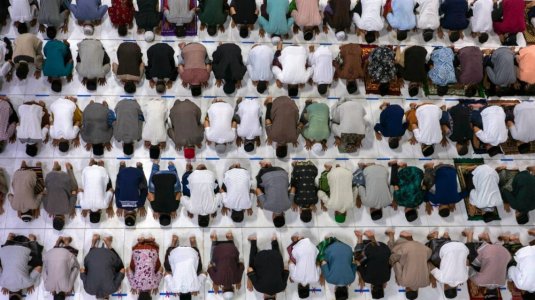The coronavirus pandemic has forced drastic changes across the world - many people face unemployment, travel plans have been cancelled and public places are empty as some work from home, practise social distancing and self isolate.
As most countries enforced restrictions on movement to curb the spread of the novel virus, at one point it was estimated 3 billion people were under some form of lockdown.
Religous groups have adjusted to the new realities, including Muslims.
The coronavirus pandemic will see the world's Muslim population - about 2 billion people - observe the holy month of Ramadan in new ways, refraining from social gatherings to break fasts, abandoning communal prayers and even providing charity at a distance.
In most Muslim-majority nations, mosques have closed and Friday prayers, which gather up to thousands of worshippers at a time, have been suspended.
Umrah - a mini-pilgrimage that takes place year-round at the Masjid al-Haram, or the Grand Mosque, in Mecca, Saudi Arabia was suspended indefinitely.
Saudi Arabia announced on Tuesday that Taraweeh, special Ramadan prayers at the Grand Mosque and Al-Masjid an-Nabawi, the Prophet Muhammad's mosque, in Medina, will take place, but with no public attendance.
Only mosque staff are expected to perform the nightly prayers, as recently reported.
These far-reaching steps are unusual in the 1400-year history of Islam, with no verifiable evidence to suggest mass gatherings have been suspended on this scale during Ramadan.
But there have been times when mass religious gatherings were partially or fully halted in the Muslim world.
"The closing of mosques or cancelling mass gatherings ... has happened many times for different reasons," Mutaz Al-Khatib, assistant professor at the Research Center for Islamic Legislation and Ethics at Hamad Bin Khalifa University in Doha, Qatar, told Al Jazeera, explaining that wars, natural disasters such as floods, and epidemics have previously halted religious events.
Here are some examples through history when Muslims have changed traditions amid critical circumstances.
Qurmatian raid, 930
The annual Hajj pilgrimage was cancelled after the leader of the Qurmatian tribe, based in eastern Arabia (present-day Bahrain), attacked Mecca in unprecedented fashion.
Tens of thousands of people, as many as 30,000 according to some accounts, were killed.
"The Qurmatian raid was a significant incident ... it was quite a big moment in Islamic history", Umar al-Qadri, an Islamic scholar and chief imam at the Islamic Centre of Ireland in Dublin, told Al Jazeera.
"Abu Tahir al-Jannabi, who led the raid, not only attacked Mecca and prayers were suspended, [he] also disrespected very sacred symbols of Islam," he added.
The Black Stone, a rock set into a corner of the Kaaba, was looted and pieces of it were stolen.
The group also desecrated the holy Well of Zamzam, which is close to the Kaaba, throwing in bodies of murdered pilgrims.
After the attack, the Hajj was suspended. The Black Stone was finally returned to Mecca some 20 years later.
Cholera outbreak, 19th century
Devastating cholera outbreaks several times throughout the 19th century resulted in the suspension of pilgrimages, including Hajj in 1837 and 1846.
After the disease returned in 1865 in Hejaz, a region of Saudi Arabia that includes Mecca, an international conference was called in Constantinople, modern-day Istanbul.
It was decided that quarantine ports would be set up in places like Sinai and Hejaz to help limit the spread of the disease, as pilgrims set on their journey to perform Hajj.
Between 1830 and 1930, there were at least 27 cholera outbreaks among pilgrims in Mecca.
Grand Mosque seizure, 1979
A Saudi armed group of 400 to 500 men seized the Grand Mosque between November and December 1979, forcing the mosque's closure for at least two weeks.
The takeover was led by a former Saudi soldier, Juhayman ibn Muhammad ibn Sayf al-Otaybi, who was critical of the kingdom's ruling family, and called for a return to what he deemed the original Islam.
The siege finally ended after Saudi forces retook the mosque, helped by a French tactical police unit.
Ebola outbreak, 2014
As the Ebola outbreak peaked in the early 2010s, countries around the world took measures to suspend issuing visas for several west African states, the epicentre of the virus.
In 2014, Saudi Arabia temporarily stopped issuing Umrah and Hajj visas for citizens of Guinea, Liberia and Sierra Leone.
Syrian war, 2016
On April 29, Friday prayers were cancelled in the Syrian city of Aleppo after a series of government-led air strikes that left mosques in ruins.
Religious councils called on Aleppo residents to keep away from mosques, the first time such a step was taken in the historical city.
"For the first time in the oldest city in the world, the Islamic city of Aleppo, the religious councils have decided to cancel Friday prayers because of the brutal war on human life," a joint statement said.
"This is to save people who have become a target for the regime [government] and to save others in this massacre."
https://www.aljazeera.com/news/2020...d-muslim-worship-history-200420210254391.html







